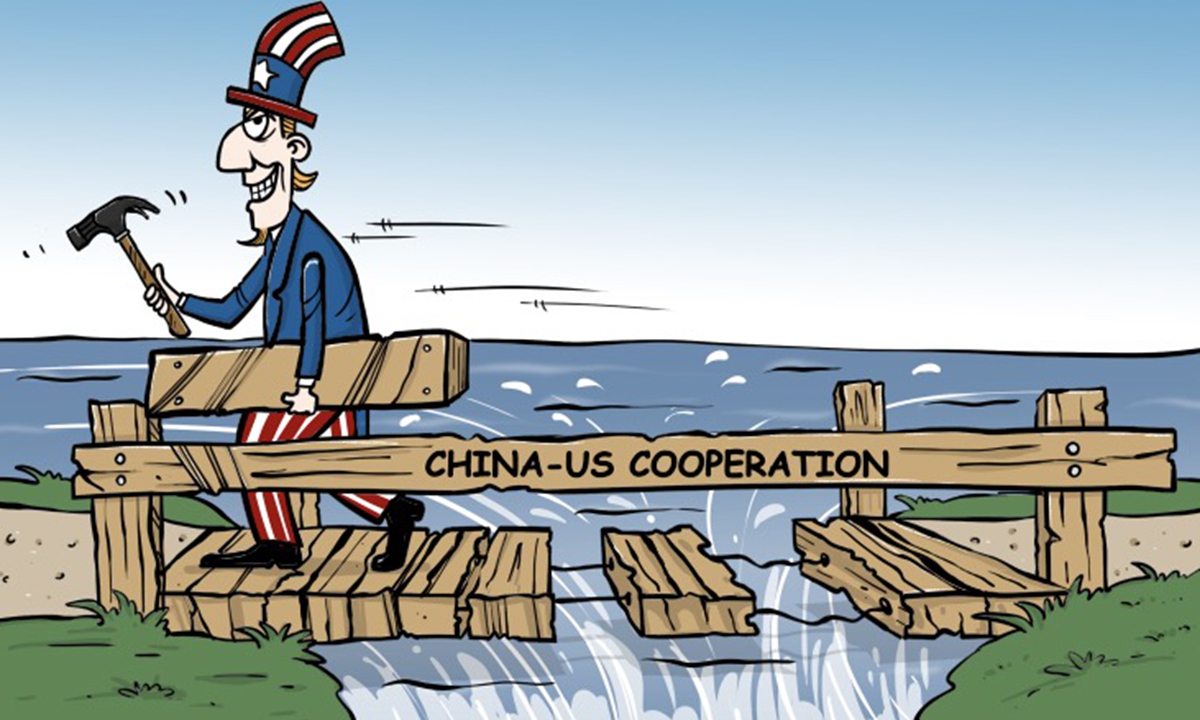
Illustration: Chen Xia/GT
I remember how happy Americans were with Nixon opening up China-US relations in 1972. I was in university then studying international relations. My parents were very happy about the establishment of relations and my brother began studying Chinese for two years. Now we have a 180-degree opposite foreign policy to Nixon's legacy. A tragedy.
The reckless visit to Taiwan island by Nancy Pelosi, Speaker of the US House of Representatives, severely damages US-China relations. Relations were already at rock bottom, but the Pelosi visit plunges them to new depths. The near-term impact of the visit is severe and the long-term impact may be considerable.
The Pelosi Taiwan island escapade presents yet another example of the duplicity of the US and its diplomacy, critics say. Additionally, it is also a demonstration of the incompetence of the Biden administration and the hostility toward China in the US Congress.
How can US-China relations be stabilized in light of the Pelosi visit and the seeming implacable hostility of Washington? Relations may not be stabilized any time soon and apparently, they will continue to deteriorate with regional, as well as with global implications.
Pelosi is second in succession to the president. She is also third, after the president and vice president, in the official diplomatic protocol of the US, except in a case where a state governor is present for a diplomatic function in his own state.
According to the US Constitution, the president is in charge of foreign policy and he is also the commander in chief of the military. Biden did not prevent the Pelosi visit nor did he deny her the US of an official aircraft. The use of an official aircraft signifies that the visit was not a private one.
The role of the House of Representatives in foreign policy is limited to oversight and to its appropriations authority such as for the State Department budget. The role of the Senate is limited to oversight, to giving advice and consent, and to confirming ambassador and high official appointments.
Again, the US president is in charge of foreign policy. Pelosi as a Democrat is a member of the president's own political party. There are no excuses for the White House for the damage of the visit.
Washington's Cold War mindset is the proximate cause of this crisis in US-China relations. The fundamental geopolitics of the US has not changed since World War II and the strategic concept of "containment" of the Eurasian landmass.
The decades-old containment policy depends on the NATO alliance in Europe to contain Russia and on the US hub and spokes alliance system in the Pacific. In recent years, the globalization of NATO has commenced and the concept of the so-called "Indo-Pacific" was created, with the former US Pacific Command being renamed during the Trump administration as the "Indo-Pacific" Command.
Economic warfare and information warfare are part and parcel of Washington's containment policy. Both are directed against not only China, but also against Russia.
While Ukraine is used as a dagger pointed against Russia, Taiwan island is used as an "unsinkable aircraft carrier" and "leverage" against Chinese mainland.
The present-day Taiwan lobby is an outgrowth of the advocacy groups calling for American support for the Kuomintang regime during the period from the 1930s to 1979. These lobbying groups dominated Congress and naturally spread a lot of money around in its lobbying efforts. Nothing has changed except that the old lobby was pro-KMT, whilst in recent years it has shifted to support Taiwan separatists and the DPP.
As for the American public, it is doubtful many could locate Taiwan island on a map.
If Americans could do so, the thought might occur that Taiwan island is to China as Hawaii is to the US. That is to say, an integral part of China although being offshore. Does China support separatist forces in Hawaii or send Hawaii or a massive amount of military equipment?
Does the Pelosi visit close the Nixon opening to China a half century ago? Not entirely, but US-China relations are severely hurt by her reckless adventure. So far, China's ambassador to Washington has not been recalled for consultation and the US ambassador remains in Beijing. But repairing the damage from the Pelosi visit will take considerable effort and time.
Washington must drop its Cold War mentality, its trade war, its tech war, and its unnecessary provocations. To continue on its present foreign policy track, the US will hit a dead end.
The author is an educator and former senior professional staff member of the Senate Committee on Foreign Relations. opinion@globaltimes.com




